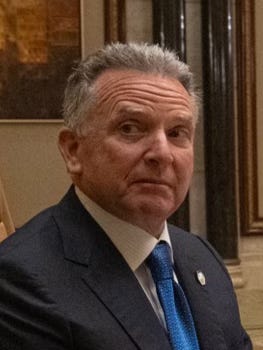U.S. special envoy Steve Witkoff confirmed on October 19 that his team had received calls from the Iranians, which he framed as part of a pursuit of a “long-term diplomatic solution with Iran.” Esmaeil Baghaei, the Iranian Foreign Ministry spokesperson, acknowledged that mediated contacts had occurred but dismissed speculation about imminent negotiations. “As long as excessive demands exist,” he said, “there will be no basis for understanding.” Egypt has reportedly taken a leading role in facilitating these indirect talks, signaling that both sides are maintaining diplomatic ties without formal negotiations.
Foreign Minister Abbas Araghchi stated that Iran is open to dialogue only if it is conducted under mutual respect and free from external pressure. He criticized President Trump’s calls for talks as contradictory and insincere.
Comments from IAEA Director General Rafael Grossi also touched a nerve in Iran. Grossi asserted that Iran’s key nuclear sites at Isfahan, Natanz, and Fordow suffered severe damage during the U.S.–Israeli bombardment earlier this year, but noted that Iran’s enriched uranium survived the attack and is likely stored in the damaged facilities. Grossi stated that while there is no evidence of active weaponization, he stated that Iran must allow full access to inspectors to ensure transparency. He warned that if diplomacy fails, the world could again face “the use of force,” yet welcomed Tehran’s decision not to withdraw from the Nuclear Non-Proliferation Treaty.
Following Rafael Grossi’s comments that Iran’s nuclear path “has not been completely blocked,” Araghchi issued a strong response, warning that such remarks were either “motivated by misplaced concern or intended as a threat.” He added, “Those who make these threats should understand that repeating a failed experiment will lead only to another failure.” His comments underscored Iran’s anger over suggestions of renewed use of force should diplomacy fail, while reaffirming Tehran’s position that the nuclear program remains peaceful and protected under Khamenei’s religious decree prohibiting nuclear weapons.
Also this week, Iran’s Supreme Leader Ali Khamenei delivered a forceful speech that condemned U.S. aggression and suggested the U.S. wants to impose terms on Iran. Addressing Iran’s scientific and athletic elite, Khamenei celebrated their achievements as symbols of national pride and resilience, declaring that the nation’s progress “belongs to its own youth and scientists.”
Responding to Trump’s claim that U.S. airstrikes had “destroyed” Iran’s nuclear infrastructure, Khamenei said, “Very well, keep dreaming. Who are you to decide whether Iran should have nuclear technology?” Khamenei emphasized that Iran’s missile and nuclear capabilities are entirely indigenous and can be rebuilt if needed, while denouncing the United States and Israel as partners in crimes during the Gaza war and accusing Washington of hypocrisy and terrorism.
“Trump says he is a dealmaker,” Khamenei said, “but if a deal is accompanied by coercion and its outcome is predetermined, it is not a deal but rather an imposition and bullying.” While many Western observers have interpreted the remarks as a hard rejection of future negotiations, they are in line with many of Khamenei’s remarks over the years - including in March before the start of new negotiations between the U.S. and Iran. Then, Khamenei stated “The insistence on the part of some bully states on negotiations is not to resolve issues, but to dominate and impose their own expectations…The Islamic Republic of Iran will definitely not accept their demands.”
The June war remains a defining event shaping the current landscape. The twelve-day conflict began with massive Israeli airstrikes on Iran’s nuclear and military facilities, later joined by the United States. Iran retaliated with missile and drone attacks on Israel and a U.S. base in Qatar. Though the cease-fire announced by Trump ended open hostilities, the strikes caused extensive damage and led to Iran’s parliamentary decision to suspend cooperation with the IAEA. The law tied any future collaboration to sanctions relief and approval by the Supreme National Security Council. While Iran briefly permitted limited IAEA visits to non-damaged facilities, it has since halted these inspections, declaring that with sanctions restored and the Cairo understanding voided, the IAEA has “no standing” in Iran.
In this environment, even a limited de-escalation would be a major breakthrough. With enrichment activity halted not by agreement but by destruction, near-term diplomacy could focus on ensuring site safety, establishing structured IAEA inspections for damaged facilities, and verifying pre-strike stockpiles of enriched uranium. Such steps could pave the way for partial sanctions relief tied to verifiable progress. However, without political flexibility in Washington and solid evidence that the Trump administration is willing to find common ground instead of totally impose its will, the situation is likely to remain frozen—an uneasy stalemate in which each side waits for the other to move first, and risks of renewed military conflict persist.


